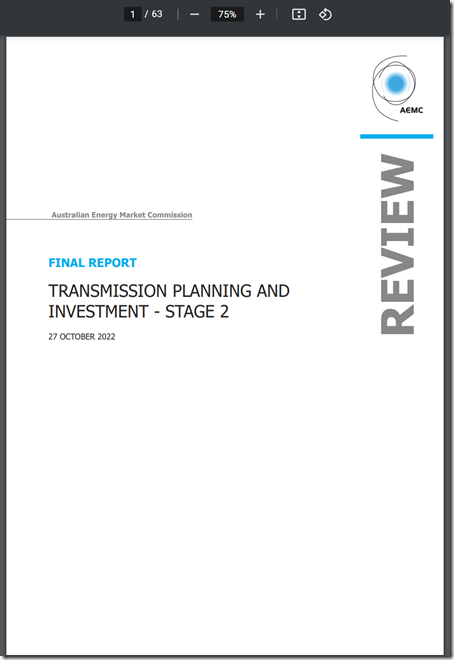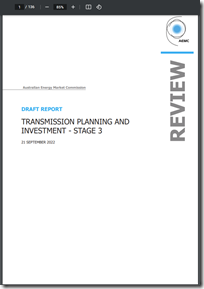Last Friday I noted how it had been a busy week – with All Energy providing a meeting point for ~10,000 registered attendees, and a number of different reports released. I wrote about several reports released by the AEMO:
1) The QED for Q3 2022; and
2) The preliminary report into the major incident in Tasmania on Friday 14th October 2022; and
3) The Scheduling Error Report about the operating glitch on 10th August 2022.
… however I should have also noted that the AEMC was busy, publishing a final report as part of Stage 2 of the Transmission Planning and Investment Review on Thursday 27 October 2022.
This is something we’ll consider with interest
(A) What the AEMC notes
In the Media Release that accompanied the release of this Final Report for Stage 2 titled ‘Greater clarity around social licence among final recommendations to improve certainty on transmission’, the AEMC notes:
‘The Commission considers there are several opportunities for additional guidance to be provided in the Rules and by the Australian Energy Regulator (AER), to assist in social licence being obtained and maintained. They include:
(a) Cost recovery – that the AER provides additional guidance to stakeholders regarding how the costs associated with building and maintaining social licence for major transmission projects be considered and assessed as part of the regulatory process.
(b) Engagement – that the AER provides additional guidance to stakeholders around its expectations of transmission network service providers (TNSPs) regarding engagement and consultation with local communities affected by major transmission projects at key stages of the planning process.
The Commission also recommends changes be made to the national electricity rules (NER) to ensure the expectations on TNSPs to engage and consult local communities at key points in the planning process are consistent for all transmission projects identified through the ISP.’
The Stage 2 report itself reminds readers that…
‘This Review is being delivered in stages. This recognises that some issues can be addressed more quickly, while others will require significant work due to their inherent complexity. These stages are:
Stage 2 – near-term reforms: This stage focuses on recommendations to help manage uncertainty in the near-term, with solutions to these issues potentially being able to be implemented sooner. Figure 1: Stage 2 of the Transmission Review is part of a larger body of work on transmission reform 0 Source: AEMC. iv Australian Energy Market Commission Final report TPIR Stage 2: Near-term reforms 27 October 2022
Stage 3 – longer-term reforms: This stage focuses on priority issues that are of considerable complexity, with further consideration required to establish the scope and source of issues prior to considering proportionate solutions. ’
… and, in particular, I note that Stage 3 is slated to cover
(B) For more information about Stage 2
For more information, please refer to the Project Page for this project (EPR0087) here. Note that there is to be a virtual public forum this coming Thursday morning, 3rd November 2022.
1) The forum will set out the key findings and final recommendations in the Stage 2 final report. Stakeholders will be given an opportunity to ask questions.
2) To register for this forum please visit the AEMC’s registration page.
(C) About Stage 3
The AEMC published a draft report as part of Stage 3 of the Transmission Planning and Investment Review on 21 September 2022:
The AEMC notes that…
‘… the draft positions in Stage 3 seek to examine several areas in the framework where the regulatory treatment of major projects can be simplified, made timelier, and provide more certainty.
The Commission has drawn on stakeholder feedback to prioritise five issues in the Stage 3 draft report:
(a) streamlining the economic assessment process
(b) emissions abatement
(c) concessional finance
(d) incentives and the TNSPs exclusive right and
(e) managing cost risk and uncertainty on the ex-ante framework.’
Stakeholders are invited to make submissions to the stage 3 draft report by this Thursday 03 November 2022.




Leave a comment